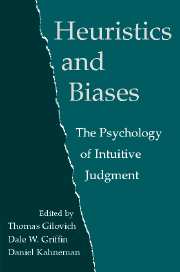Book contents
- Frontmatter
- Contents
- List of Contributors
- Preface
- Introduction – Heuristics and Biases: Then and Now
- PART ONE THEORETICAL AND EMPIRICAL EXTENSIONS
- 1 Extensional versus Intuitive Reasoning
- 2 Representativeness Revisited: Attribute Substitution in Intuitive Judgment
- 3 How Alike Is It? versus How Likely Is It?: A Disjunction Fallacy in Probability Judgments
- 4 Imagining Can Heighten or Lower the Perceived Likelihood of Contracting a Disease: The Mediating Effect of Ease of Imagery
- 5 The Availability Heuristic Revisited: Ease of Recall and Content of Recall as Distinct Sources of Information
- 6 Incorporating the Irrelevant: Anchors in Judgments of Belief and Value
- 7 Putting Adjustment Back in the Anchoring and Adjustment Heuristic
- 8 Self-Anchoring in Conversation: Why Language Users Do Not Do What They “Should”
- 9 Inferential Correction
- 10 Mental Contamination and the Debiasing Problem
- 11 Sympathetic Magical Thinking: The Contagion and Similarity “Heuristics”
- 12 Compatibility Effects in Judgment and Choice
- 13 The Weighing of Evidence and the Determinants of Confidence
- 14 Inside the Planning Fallacy: The Causes and Consequences of Optimistic Time Predictions
- 15 Probability Judgment across Cultures
- 16 Durability Bias in Affective Forecasting
- 17 Resistance of Personal Risk Perceptions to Debiasing Interventions
- 18 Ambiguity and Self-Evaluation: The Role of Idiosyncratic Trait Definitions in Self-Serving Assessments of Ability
- 19 When Predictions Fail: The Dilemma of Unrealistic Optimism
- 20 Norm Theory: Comparing Reality to Its Alternatives
- 21 Counterfactual Thought, Regret, and Superstition: How to Avoid Kicking Yourself
- PART TWO NEW THEORETICAL DIRECTIONS
- PART THREE REAL-WORLD APPLICATIONS
- References
- Index
18 - Ambiguity and Self-Evaluation: The Role of Idiosyncratic Trait Definitions in Self-Serving Assessments of Ability
from PART ONE - THEORETICAL AND EMPIRICAL EXTENSIONS
Published online by Cambridge University Press: 05 June 2012
- Frontmatter
- Contents
- List of Contributors
- Preface
- Introduction – Heuristics and Biases: Then and Now
- PART ONE THEORETICAL AND EMPIRICAL EXTENSIONS
- 1 Extensional versus Intuitive Reasoning
- 2 Representativeness Revisited: Attribute Substitution in Intuitive Judgment
- 3 How Alike Is It? versus How Likely Is It?: A Disjunction Fallacy in Probability Judgments
- 4 Imagining Can Heighten or Lower the Perceived Likelihood of Contracting a Disease: The Mediating Effect of Ease of Imagery
- 5 The Availability Heuristic Revisited: Ease of Recall and Content of Recall as Distinct Sources of Information
- 6 Incorporating the Irrelevant: Anchors in Judgments of Belief and Value
- 7 Putting Adjustment Back in the Anchoring and Adjustment Heuristic
- 8 Self-Anchoring in Conversation: Why Language Users Do Not Do What They “Should”
- 9 Inferential Correction
- 10 Mental Contamination and the Debiasing Problem
- 11 Sympathetic Magical Thinking: The Contagion and Similarity “Heuristics”
- 12 Compatibility Effects in Judgment and Choice
- 13 The Weighing of Evidence and the Determinants of Confidence
- 14 Inside the Planning Fallacy: The Causes and Consequences of Optimistic Time Predictions
- 15 Probability Judgment across Cultures
- 16 Durability Bias in Affective Forecasting
- 17 Resistance of Personal Risk Perceptions to Debiasing Interventions
- 18 Ambiguity and Self-Evaluation: The Role of Idiosyncratic Trait Definitions in Self-Serving Assessments of Ability
- 19 When Predictions Fail: The Dilemma of Unrealistic Optimism
- 20 Norm Theory: Comparing Reality to Its Alternatives
- 21 Counterfactual Thought, Regret, and Superstition: How to Avoid Kicking Yourself
- PART TWO NEW THEORETICAL DIRECTIONS
- PART THREE REAL-WORLD APPLICATIONS
- References
- Index
Summary
When people are asked to evaluate their own abilities, the assessments they provide tend to be self-serving. Indeed, often the appraisals that people endorse appear to be favorable to a logically impossible degree.
Perhaps the most direct demonstration of self-serving appraisal is the above average effect. When asked to judge their own capacities and performances in a specific domain against those of their peers, people predominantly respond, “I'm above average.” The above average effect has been demonstrated in the realm of driving ability (Svenson, 1981), ethics (Baumhart, 1968), health (Larwood, 1978: Weinstein, 1980), and managerial skills (Larwood & Whittaker, 1977). The most extreme documentation of this phenomenon comes from a survey conducted by the College Board in 1976–1977 of 1 million high school students. When rating themselves vis-á-vis their peers, 70% rated themselves as above average in leadership ability, whereas only 2% judged themselves as below average. When considering athletic ability, 60% considered themselves above the median and only 6%, below. When asked to judge their ability to get along with others, all students rated themselves as at least average, 60% placed themselves in the top 10%, and 25% placed themselves in the top 1%. The extremity of the phenomenon in this particular survey might be chalked up to youthful exuberance, although the above average effect occurs even among older and more educated people.
Information
- Type
- Chapter
- Information
- Heuristics and BiasesThe Psychology of Intuitive Judgment, pp. 324 - 333Publisher: Cambridge University PressPrint publication year: 2002
Accessibility standard: Unknown
Why this information is here
This section outlines the accessibility features of this content - including support for screen readers, full keyboard navigation and high-contrast display options. This may not be relevant for you.Accessibility Information
- 14
- Cited by
